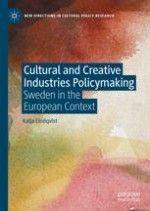2024 | OriginalPaper | Buchkapitel
5. CCI Policymaking at the EU Level
verfasst von : Katja Lindqvist
Erschienen in: Cultural and Creative Industries Policymaking
Aktivieren Sie unsere intelligente Suche, um passende Fachinhalte oder Patente zu finden.
Wählen Sie Textabschnitte aus um mit Künstlicher Intelligenz passenden Patente zu finden. powered by
Markieren Sie Textabschnitte, um KI-gestützt weitere passende Inhalte zu finden. powered by
